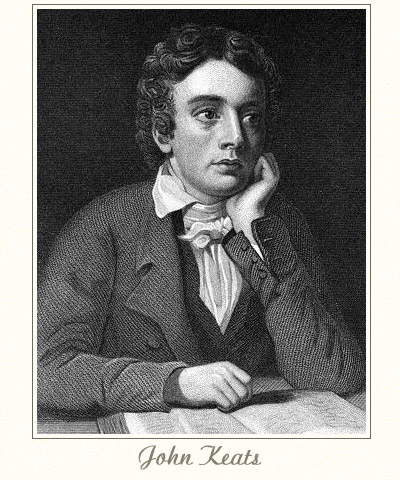| |
|
Season of mists and mellow fruitfulness!
Close bosom-friend of the maturing sun;
Conspiring with him how to load and bless
With fruit the vines that round the thatch-eaves run;
To bend with apples the mossed cottage-trees,
And fill all fruit with ripeness to the core;
To swell the gourd, and plump the hazel shells
With a sweet kernel; to set budding more,
And still more, later flowers for the bees,
Until they think warm days will never cease,
For Summer has o’erbrimmed their clammy cells.
Who hath not seen thee oft amid thy store?
Sometimes whoever seeks abroad may find
Thee sitting careless on a granary floor,
Thy hair soft-lifted by the winnowing wind;
Or on a half-reaped furrow sound asleep,
Drowsed with the fume of poppies, while thy hook
Spares the next swath and all its twined flowers;
And sometimes like a gleaner thou dost keep
Steady thy laden head across a brook;
Or by a cider-press, with patient look,
Thou watchest the last oozings, hours by hours.
Where are the songs of Spring? Ay, where are they?
Think not of them, thou hast thy music too, -
While barred clouds bloom the soft-dying day
And touch the stubble-plains with rosy hue;
Then in a wailful choir the small gnats mourn
Among the river sallows, borne aloft
Or sinking as the light wind lives or dies;
And full-grown lambs loud bleat from hilly bourn;
Hedge-crickets sing, and now with treble soft
The redbreast whistles from a garden-croft;
And gathering swallows twitter in the skies.
This poem is in the public domain.
|

John Keats (1795-1821) was an English Romantic poet. He lost both parents before the age of fifteen and was ultimately raised by his grandmother, who saw that John got a good education. He spent a number of years studying to be a surgeon, but began indulging his growing interest in literature by writing poetry. John's early published work received blistering criticism, in part because he had none of the social standing, wealth, or university connections deemed essential in literary circles, but he became friends with several leading poets of the day and began to build a network of supporters. John published only three books of poetry during his lifetime and garnered no significant fame during that time but, today, he is considered one of the world's great poets. This poem is considered one of his finest.
 Buy Now Buy Now Buy Now Buy Now
|
|
EstherJ:
A very enjoyable read.
Posted 11/08/2024 11:47 AM
|
Larry Schug:
Thanks,Jayne. This is a fine way to begin the day.
Posted 11/08/2024 08:23 AM
|
Gilbert Allen:
One of my favorite poems. The sounds in the final stanza are exquisite.
Posted 11/08/2024 07:53 AM
|
romanots:
Keats was the first poet I read who wrote words I didn't just admire but articulated what I felt in my heart. The poem was "Bright Star."
Posted 11/08/2014 06:04 AM
|
Katrina:
While Whitman lived into his seventies, Keats was a medic, who lost interest in surgery, became a career poet, and died at twenty five.
Posted 11/08/2014 04:59 AM
|
|
|
|






